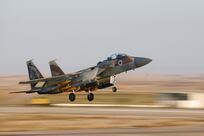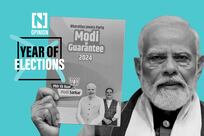DAMASCUS // Young protesters and veteran dissidents have held their first large-scale meeting inside Syria, bringing divided opposition groups a step closer to unification.
About 300 anti-regime figures took part in the closed meeting at a farmhouse in Dreesh, 15 kilometres north of Damascus, on Saturday, with a follow-up news conference in the capital yesterday morning.
It was the largest anti-regime gathering inside Syria since the Baath party seized power in a military coup in the 1960s.
Even more significant than the size of the gathering was the bringing together of experienced pro-democracy activists, many of whom have campaigned for civil rights in Syria for decades, and the new generation of young revolutionaries who have shaken the autocratic regime with unprecedented street protests.
Until now, the old-guard dissidents and youth demonstrators had been largely distinct from one another. Those taking part in protests have also had to shield their identities, with tens of thousands of suspected demonstrators arrested.
A previous effort by experienced activists and protesters to meet in Damascus in July collapsed when security forces killed at least 16 people outside the proposed venue the day before the conference was scheduled to happen, forcing the organisers to abandon their plans.
"We had people from across the country, from all provinces, age groups and demographics, taking part," said Saleh Mohammad, a veteran Kurdish opposition politician involved in Saturday's gathering. "Among them were about 100 young activists representing the street; young activists who are in the street protesting every day, young protesters who have been arrested for taking part in demonstrations."
Billed as the "general conference" of National Coordination Committees (NCC), the meeting brought together nine Arab and liberal Islamic opposition parties, four Kurdish parties, four human-rights groups and seven civil-rights campaign organisations, in addition to young protesters and leading dissidents such as the writer Michel Kilo and economist Aref Dalila.
Some of those involved were signatories to the 2005 Damascus Declaration, a call for peaceful, gradual democratic reforms that landed many dissidents in jail.
The meeting elected an 80-member central council, with young protesters filling more than 25 per cent of the positions t. The council will seek to establish more contacts with other anti-regime groups and activists, both inside and outside Syria, and will work to expand the uprising. It committed to using only peaceful methods in pursuit of democracy.
Abdul Aziz Al Kheir, an NCC council member who spent 13 years in jail for political activism, said: "For the overthrow of the tyrannical and corrupt security regime and for democratic change, the peaceful revolution of the Syrian people must continue." Organisers did not ask the authorities for permission to hold the meeting and feared it would be raided.
One activist said "We expected security might try to break it up but they seem to have decided that it would have created more problems for them to do that than it would to let us talk." The Syrian authorities have come under mounting international pressure, even from close allies such as Iran and Russia, to halt a crackdown that, according to the UN, has claimed 2,600 lives.
Damascus has been urged to find a political answer to the unrest, to pull back army units and enter into talks with opposition groups as part of a transition to democracy.
The president, Bashar Al Assad, who insists he is fighting a militant Islamist insurgency, has said political reforms are under way - a claim rejected by the UN secretary-general, Ban Ki-moon.
An independent Syrian political analyst said: "It's a significant advance for the opposition inside Syria to hold a meeting of this scale and with protesters actually involved. It shows a new unity is starting to emerge - new opposition organisations are coming together to challenge the regime." Mr Mohammad, the Kurdish political activist, said there had been universal agreement on the need to replace Syria's one-party police state with a multiparty democracy founded on the rule of law and equal rights. But he acknowledged there had been differences between young and old activists.
"The young revolutionaries want to see everything changed quickly," he said. "They told us, 'You need to be in front of us, not following behind'. The older political activists believe this is going to take time."
According to the independent political analyst, old-guard dissidents are more concerned about the consequences of the regime collapsing, leaving Syria in chaos. "They want a gradual increase in pressure and a managed transition to democracy, even if that means Assad himself stays in power for a while longer," he said. "The protesters want the whole regime gone now. They fear that waiting will allow the security forces to arrest or kill everyone and finish the uprising, which will mean all their sacrifices have been in vain."
The Muslim Brotherhood was in talks to join the NCC but did not, although activists said discussions were continuing. Membership is a capital offence in Syria.
psands@thenational.ae




